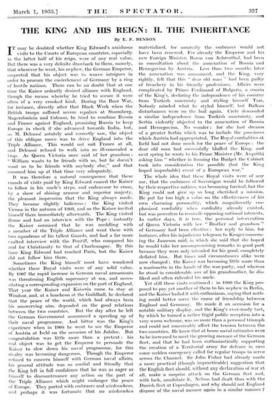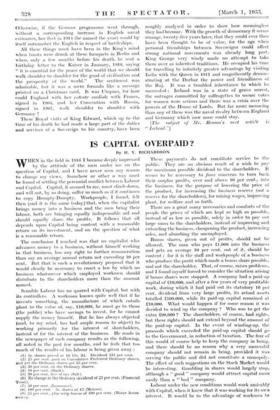THE KING AND HIS REIGN : II. THE INHERITANCE
By E. F. BENSON IT may be doubted whether King Edward's assiduous visits to the Courts of European countries, especially in the latter half of his reign, were of any real value. But there was a very definite drawback to them, namely, that wherever he went, his nephew, the German Emperor, suspected that his object was to weave intrigues in order to procure the encirclement of Germany by a ring of hostile nations. There can be no doubt that at one time the Kaiser ardently desired alliance with England, though the means whereby he tried to secure it were often of a very crooked kind. During the Boer War, for instance, directly after that Black 'Week when the British troops suffered severe repulses at Stormberg, Magersfontein and Colenso, he tried to combine Russia and France against England, promising Russia to keep Europe in check if she advanced towards India, but, as M. Deleasse astutely and correctly saw, the object of this oblique move was to drive England into the Triple -Alliance. This would not suit France at all, and Delcasse refused to walk into so ill-concealed a trap. As Queen Victoria once said of her grandson : " William wants to be friends with us, but he doesn't want us to be friends with anybody else," and that summed him up at that time very adequately.
It was therefore a natural consequence that these rounds of visits paid by King Edward caused the Kaiger to follow in his uncle's steps, and endeavour to erase, by a show of shining armour and superior majesty, the pleasant impression that the King always made. They becaine slightly ludicrous : the King visited Vienna in the autumn of 1903, and so the Kaiser invited himself there immediately afterwards: The King visited Rome and had an interview with the Pope : instantly the Kaiser surmised that he was meddling with a mne►nber of the Triple Alliance and went there with two squadrons of his tallest Guards, and had a far more exalted interview with the Pontiff, who compared his zeal for Christianity to that of Charlemagne. By this time King Edward had reached Paris, but the Kaiser did not follow him there.
Sometimes the King himself must have wondered whether these Royal visits were of any solid value. By 1907 the rapid increase in German naval armaments was threatening English supremacy at sea, and neces- sitating a corresponding expansion on the part of England. That year the Kaiser and Kaiserin came to stay at Windsor, and, at a luncheon at the Guildhall, he declared that the peace of the world, which had always been his unswerving aim, depended on the good relations between the two countries. But the day after he left the German Government announced a speeding up of their naval programme. And bitter was the King's experience when in 1908 he went to see the Emperor of Austria at Ischl on the occasion of his Jubilee. But congratulation was little more than a pretext : his real object was to get the Emperor to persuade the Kaiser to slow down his naval programme, for this rivalry was becoming dangerous. Though the Emperor refused to concern himself with German naval ,affairs, his general attitude was so cordial and friendly that the King left in full confidence that he was as eager as himself to discountenance any action on the part of the Triple Alliance .whieh might endanger the peace of Europe. They parted with embraces and wicdersehens, and perhaps it was fortunate that no wiedersehen materialized, for assuredly the embraces would not have been renewed. For already the Emperor and his new Foreign Minister, Baron von Achrenthal, had been in consultation about the annexation of Bosnia and Herzegovina by Austria. Less than two months later the annexation was announced, and the King, very rightly, felt that this " dear old man " had been guilty of treachery in his friendly professions. Affairs were complicated by Prince Ferdinand of Bulgaria, a cousin of the King's, declaring the independence of his country from Turkish suzerainty and styling himself Tsar. Nobody minded what he styled himself, but Balkan disturbances were on the boil again. Crete demanded a similar independence from Turkish suzerainty, and Serbia violently objected to the annexation of Bosnia and Herzegovina. No wonder : for she had dreams of a greater Serbia which was to include the provinces which Austria had appropriated. The Royal cordialities at Ischl had not done much for the peace of Europe : the dear old man had successfully bluffed the King, and next spring he wrote to his Prime. Minister (Mr. Asquith) asking him " whether in framing the Budget the Cabinet took into consideration the possible (but the King hoped improbable) event of a European war."
The whole idea that these Royal visits were of any use, that the embraces of Sovereigns would be followed by their respective nations, was becoming farcical, but the King could not give up so long cherished a mission. He put far too high a value on the effectiveness of his own charming personality, which magnificently em- phasized cordiality when cordiality already existed, but was powerless to reconcile opposing national interests. In earlier days, it is true, the personal intervention of Queen Victoria with her " Brother and grandson ". of Germany had been effective : her reply to him, for instance, after his injudicious telegram to Kruger concern- ing the Jameson raid, in which she said that she hoped he would take her uncompromising remarks in good part because they were only intended for his good, completely deflated him. But times and circumstances alike were now changed ; the Kaiser was becoming little more than a marionette in the hands of the war-party, and whereas he stood in considerable awe of his grandmother, he dis- liked and often ridiculed his uncle.
Yet still these visits continued : in 1909 the King pro- posed to pay yet another of them to his nephew in Berlin, and the Kaiser hailed it with enthusiasm, saying that noth- ing could better serve the cause of friendship between England and Germany. He made it an occasion for a notable military display, and the King's ever-ready tact, by which he turned a rather frigid public reception into a very warm welcome, was no more than a personal triumph and could not conceivably affect the tension between the two countries. He knew that at home naval estimates were to be increased to meet the growing menace of the German fleet, and that he had been enthusiastically supporting the creation of a Territorial army for defence in case some sudden emergency called for regular troops to serve across the Channel. Sir John Fisher had already made a more practical (though impracticable) suggestion that the English fleet should, without any declaration of war at all,.make!,a surprise attack on the German fleet and, with luck, annihilate it. Nelson had dealt thus with the Danish fleet at Copenhagen, and why should not England dispose of the naval menace again in a similar manner ? Otherwise, if the German programme went through, without a corresponding increase in English naval estimates, her fleet in 1914 (he named the year) would by itself outnumber the English in respect of battleships.
All these things must have been in the King's mind when toasts were drunk at these banquets in Berlin and Avhen, only a few months before his death, he sent a birthday letter to the Kaiser in January, 1910, saying " it is essential for the peace of the world that we should walk shoulder to shoulder for the good of civilization and the prosperity of the world." The sentiment was admirable, but it was a mere formula like a message printed on a Christmas card. It was Utopian, for how could England with her entente cordiale with France, signed in 1904, and her Convention with Russia, signed in 1907, walk shoulder to shoulder with Germany ?
These Royal visits of King Edward, which up to the time of his death he had made a large part of the duties and services of a Sovereign to his country, have been roughly analysed in order to show how meaningless they had become. With the growth of democracy it seems strange, twenty-five years later, that they could ever then have been thought to be of value, for the age when personal friendships between Sovereigns could affect strong national Movements was already long_ past. King George very wisely made no attempt to take them over as inherited traditions. He occupied his time for travelling .to infinitely greater advantage by visiting India with the Queen in 1911 and magnificently demon- strating at the Durbar the power and friendliness of the Raj. It was a troubled inheritance to which he succeeded : Ireland was in a state of grave unrest, the outrages committed by suffragettes to secure votes for women were serious and there was a crisis over the powers of the House of Lords. But far more menacing than any of these was the naval rivalry between England and Germany which now none could stay.
[The subject of Mr. Benson's next article is " Ireland."]



























































 Previous page
Previous page